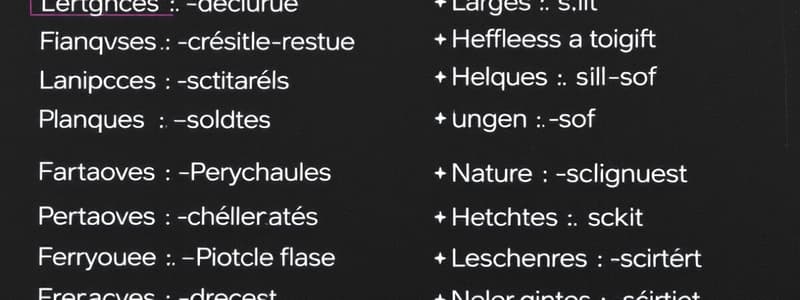Podcast
Questions and Answers
What is the French phrase for 'Goodbye'?
What is the French phrase for 'Goodbye'?
- Au revoir (correct)
- Merci
- Bonjour
- Bonsoir
Which of the following is the French word for 'sister'?
Which of the following is the French word for 'sister'?
- Oncle
- Frère
- Sœur (correct)
- Fille
What is the French word for 'Teacher'?
What is the French word for 'Teacher'?
- Le cahier
- L'élève
- Le professeur (correct)
- Le livre
What color is represented by the word 'noir'?
What color is represented by the word 'noir'?
Which phrase means 'I am happy' in French?
Which phrase means 'I am happy' in French?
What is the French term for 'notebook'?
What is the French term for 'notebook'?
Which family member is referred to as 'père'?
Which family member is referred to as 'père'?
What is the meaning of 'Ça ne me plaît pas'?
What is the meaning of 'Ça ne me plaît pas'?
Which of the following numbers is 'quarante' in French?
Which of the following numbers is 'quarante' in French?
What does 'Il fait froid' mean?
What does 'Il fait froid' mean?
Flashcards are hidden until you start studying
Study Notes
Basic Greetings
- Bonjour: Hello/Good morning
- Bonsoir: Good evening
- Salut: Hi
- Au revoir: Goodbye
- Merci: Thank you
- S'il vous plaît: Please
- Comment ça va?: How are you?
- Ça va bien, merci: I am fine, thank you.
Vocabulary For Family Members
- Mère: Mother
- Père: Father
- Frère: Brother
- Sœur: Sister
- Fils: Son
- Fille: Daughter
- Grand-mère: Grandmother
- Grand-père: Grandfather
- Tante: Aunt
- Oncle: Uncle
Classroom Vocabulary
- La salle de classe: Classroom
- Le professeur: Teacher
- L'élève: Student
- Le livre: Book
- Le cahier: Notebook
- Le crayon: Pencil
- La gomme: Eraser
- Le tableau: Board
- La chaise: Chair
- Le bureau: Desk
Colors In French
- Rouge: Red
- Bleu: Blue
- Vert: Green
- Jaune: Yellow
- Noir: Black
- Blanc: White
- Gris: Gray
- Rose: Pink
- Violet: Purple
- Orange: Orange
Expressing Feelings
- Je suis heureux/heureuse: I am happy.
- Je suis triste: I am sad.
- J'ai peur: I am scared.
- Je suis fatigué(e): I am tired.
- Je suis en colère: I am angry.
- Ça me plaît: I like it.
- Ça ne me plaît pas: I don't like it.
Numbers to 100
- 1: Un
- 2: Deux
- 3: Trois
- 4: Quatre
- 5: Cinq
- 6: Six
- 7: Sept
- 8: Huit
- 9: Neuf
- 10: Dix
- 11-19: Onze, Douze, Treize, Quatorze, Quinze, Seize, Dix-sept, Dix-huit, Dix-neuf
- 20: Vingt
- 30: Trente
- 40: Quarante
- 50: Cinquante
- 60: Soixante
- 70: Soixante-dix
- 80: Quatre-vingts
- 90: Quatre-vingt-dix
- 100: Cent
Weather
- Il fait beau: It is nice weather.
- Il fait chaud: It is hot.
- Il fait froid: It is cold.
- Il pleut: It is raining.
- Il neige: It is snowing.
- Il y a du vent: It is windy.
- C'est nuageux: It is cloudy.
Months
- Janvier: January
- Février: February
- Mars: March
- Avril: April
- Mai: May
- Juin: June
- Juillet: July
- Août: August
- Septembre: September
- Octobre: October
- Novembre: November
- Décembre: December
Days of the Week
- Lundi: Monday
- Mardi: Tuesday
- Mercredi: Wednesday
- Jeudi: Thursday
- Vendredi: Friday
- Samedi: Saturday
- Dimanche: Sunday
Basic Greetings
- "Bonjour" means Hello or Good morning, used typically until the afternoon.
- "Bonsoir" is the greeting for Good evening, appropriate after 5-6 PM.
- "Salut" is an informal way to say Hi among friends.
- "Au revoir" translates to Goodbye, a standard farewell.
- "Merci" expresses Thank you, a polite acknowledgment.
- "S'il vous plaît" means Please, used to make polite requests.
- "Comment ça va?" translates to How are you? a common inquiry about well-being.
- A typical response to "Comment ça va?" is "Ça va bien, merci," meaning I am fine, thank you.
Vocabulary For Family Members
- "Mère" refers to Mother, while "Père" signifies Father.
- "Frère" means Brother, and "Sœur" refers to Sister.
- "Fils" is used for Son, whereas "Fille" means Daughter.
- "Grand-mère" is Grandmother, and "Grand-père" means Grandfather.
- "Tante" translates to Aunt, and "Oncle" signifies Uncle.
Classroom Vocabulary
- "La salle de classe" means Classroom, the learning environment.
- "Le professeur" refers to Teacher, the individual instructing students.
- "L'élève" is Student, someone learning from a teacher.
- "Le livre" means Book, a source of information or story.
- "Le cahier" refers to Notebook, used for taking notes.
- "Le crayon" is Pencil, a common writing instrument.
- "La gomme" means Eraser, used to correct pencil mistakes.
- "Le tableau" refers to Board, typically a whiteboard or blackboard in classrooms.
- "La chaise" is Chair, a seat used in classrooms.
- "Le bureau" translates to Desk, a working surface for students and teachers.
Colors In French
- Key colors include "Rouge" (Red), "Bleu" (Blue), and "Vert" (Green).
- Other colors are "Jaune" (Yellow), "Noir" (Black), and "Blanc" (White).
- "Gris" stands for Gray, "Rose" means Pink, "Violet" for Purple, and "Orange" refers to Orange.
Expressing Feelings
- "Je suis heureux/heureuse" indicates I am happy; use "heureuse" for females.
- "Je suis triste" translates to I am sad, expressing unhappiness.
- "J'ai peur" means I am scared, conveying fear.
- "Je suis fatigué(e)" indicates I am tired; use "fatiguée" for females.
- "Je suis en colère" translates to I am angry, expressing frustration.
- "Ça me plaît" means I like it, indicating positive feelings.
- "Ça ne me plaît pas" translates as I don't like it, expressing discontent.
Numbers to 100
- Basic numbers include "Un" (1), "Deux" (2), "Trois" (3), up to "Dix" (10).
- Numbers from 11-19 are formed uniquely: "Onze," "Douze," "Treize," etc.
- Key multiples of ten: "Vingt" (20), "Trente" (30), "Quarante" (40), "Cinqueante" (50), "Soixante" (60).
- Higher groups include "Soixante-dix" (70), "Quatre-vingts" (80), "Quatre-vingt-dix" (90), and "Cent" (100).
Weather
- "Il fait beau" means It is nice weather, indicating pleasant conditions.
- "Il fait chaud" translates to It is hot, used in warm climates.
- "Il fait froid" indicates It is cold, referring to lower temperatures.
- "Il pleut" means It is raining, indicating wet weather.
- "Il neige" translates to It is snowing, referring to winter conditions.
- "Il y a du vent" means It is windy, a condition of air movement.
- "C'est nuageux" means It is cloudy, referring to overcast skies.
Months
- The months of the year include "Janvier" (January) through "Décembre" (December), with each corresponding to a specific time of the year.
Days of the Week
- The days are structured as follows: "Lundi" (Monday), "Mardi" (Tuesday), "Mercredi" (Wednesday), "Jeudi" (Thursday), "Vendredi" (Friday), "Samedi" (Saturday), and "Dimanche" (Sunday).
Studying That Suits You
Use AI to generate personalized quizzes and flashcards to suit your learning preferences.



